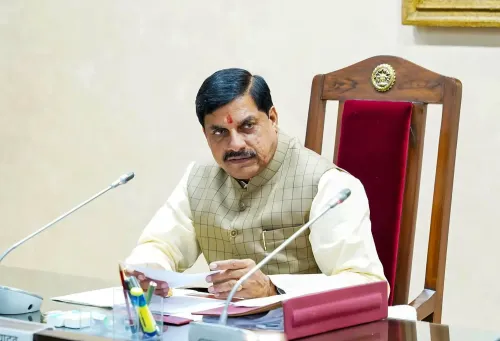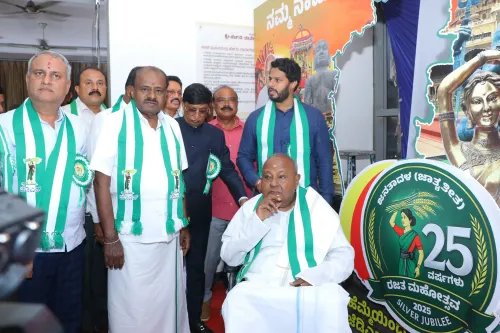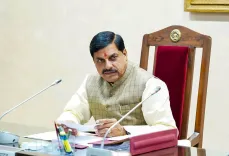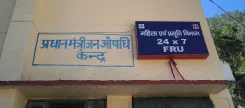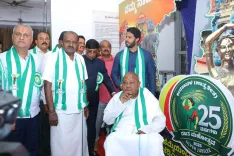Why Did the Maharashtra Government Withdraw the Hindi Language Policy?
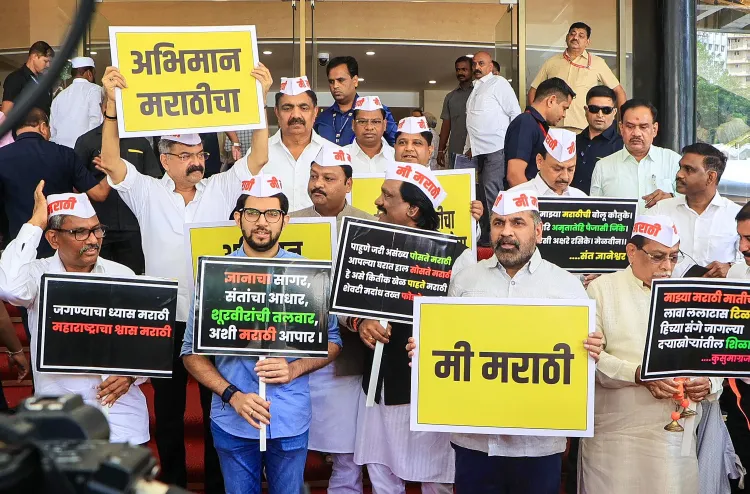
Synopsis
Key Takeaways
- Maharashtra government suspended Hindi language policy
- Public protests influenced government decisions
- Expert committee to review language education
- Political tensions over language dominance
- Future implications for regional identity
Mumbai, June 30 (NationPress) In response to significant public unrest and protests from the Opposition, the Maharashtra government has annulled two government resolutions (GRs) that aimed to enforce Hindi as a mandatory third language in Marathi and English-medium schools for students in Classes 1 to 5. Nonetheless, the ruling Mahayuti coalition asserts that this decision is merely a temporary suspension and will be reconsidered after an expert committee provides its report.
Deputy Chief Minister Devendra Fadnavis announced that a committee led by former Planning Commission member Narendra Jadhav has been established to scrutinize the trilingual policy and propose a course of action that prioritizes the needs of Marathi-speaking students.
The committee is tasked with delivering its findings within three months.
During a press briefing, Fadnavis stated that the two GRs, dated April 16 and June 17, have been revoked. He emphasized that while the state government has mandated the teaching of Marathi in schools, Hindi will continue to be optional.
This decision incited widespread protests, compelling the government to reconsider the policy.
In comments to IANS, Minister Uday Samant remarked, "You must have realized by now that this is a struggle for supremacy. The recent trolling of Marathi people clearly indicates that 'M' does not signify Marathi but rather Municipal Corporation. The public now recognizes that this was driven by political motives. The MNS, under Raj Saheb's leadership, had already signaled a protest. Subsequently, the UBT Shiv Sena joined in, sidelining MNS and celebrating what they claim as a victory."
Samant also noted that the initial three-language policy was proposed by the Dr. Raghunath Mashelkar committee, instituted during the Uddhav Thackeray-led MVA government, which had supported implementing the policy from Class 1 to 12.
Minister Chandrashekhar Bawankule supported this perspective, stating, "Our Chief Minister Devendra Fadnavis has resolved to reassess the situation, taking into account public sentiment. No decision should contradict the feelings of the populace. Even if a single person objects to a government action, it is treated with seriousness by the government."
Minister Ashish Shelar took credit for the BJP-led Mahayuti's actions, asserting, "Maharashtra has triumphed—the Marathi people have prevailed, and the BJP has emerged victorious. We have consistently maintained a clear position. Our esteemed Chief Minister Devendra Fadnavis and Mahayuti made this decision firmly in favor of Marathi identity—no one else made this decision."
Minister Chhagan Bhujbal shared his personal experience in support of Hindi: "I have no opposition to the Hindi language. When I was in the 4th grade, my teacher invited me to join the Bombay Hindi Prachar Sabha. I participated actively, and now, after almost 40 years, I hold the position of President of Mumbai Hindi Prachar Sabha."
Minister Pankaja Munde also expressed her approval of the decision, stating, "Learning and comprehending in one's native language is always more accessible for individuals and children. This is a victory for the Marathi language," while asserting that Marathi was never meant to be marginalized.
In an interview with IANS, Shiv Sena leader Manisha Kayande clarified, "The three-language formula originated from the Mashelkar committee, established during the Uddhav Thackeray government. However, there was dissent regarding which class it should be taught in. To prevent confusion among students, the government has postponed it, and an expert committee has been formed."
Nonetheless, former Home Minister Anil Deshmukh countered, stating to IANS, "There is no objection to the Hindi language. However, the directive from the state government to make Hindi compulsory at the primary school level faced opposition throughout Maharashtra. Such imposition should not occur in primary schools."
Deshmukh further mentioned that public pressure significantly influenced the rollback. "A large rally was scheduled for July 5. Fearing this, the state government rescinded this GR. We speak Hindi, but there should not be an imposition of the Hindi language in primary schools. This is the demand of the common people, and it is receiving robust support from across Maharashtra," he added.
Shiv Sena (UBT) spokesperson Anand Dubey stated to IANS, "There was extensive dissent throughout Maharashtra regarding the enforced imposition of Hindi from Classes 1 to 5. Leaders such as Uddhav Thackeray, Raj Thackeray, and many other parties opposed it. Small children, merely 5-6 years old, cannot bear the burden of learning three languages."
"We will also contest this committee. We will not allow Hindi imposition in the state. The Mahayuti will face defeat in the BMC elections because the Marathi populace has been awakened," he added.
Congress leader Pawan Khera also shared his thoughts, stating, "Our party firmly believes that it is inappropriate to impose such a heavy burden on a first-grade child to learn three languages. After fifth grade, this may be a different scenario, but it's unsuitable at such a young age."

